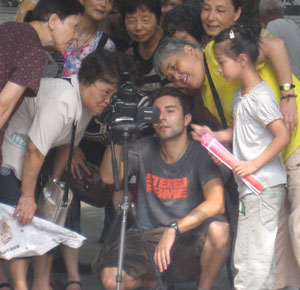Brook Silva-Braga is an award-winning documentary filmmaker. He was a producer at HBO before founding Earthchild Productions in 2005. He has since directed two feature length documentaries, A Map for Saturday, which explores the subculture of long-term travel, and One Day in Africa, a portrait of six individuals from different parts of the continent. His current project explores US/China relations through expert interviews and profiles of everyday Americans and Chinese.
How did you get started traveling?
My mom took me backpacking for three months before my second birthday, but then I had a 23 year hiatus from long term travel. On a business trip to Asia I met a couple guys on an around-the-world trip, and it sounded so cool I decided almost immediately to quit my job and take a big trip.
How did you get started making videos?
I went to a meeting of the public access TV station my sophomore year of high school and just started shooting and editing. To get something on the air you had to be able to do every job, from announcing to patching audio cables to editing to making friends with the scheduler. It was great training for where the industry is headed now with one-man do-it-all crews.
What do you consider your first “break” as a documentary maker?
I’ve had a few ‘breaks’ along the way but the one that really changed my life was having MTV pick up my first documentary. I sent them a DVD totally blind and just got lucky that the right person opened the envelope and showed the movie to their boss who showed it to their boss. If not for that I’d be back in an office job and not answering your questions.
As a traveler and story/footage gatherer, what is your biggest challenge on the road?
Because I shoot for so long on these documentaries — I’m 15 months in on my current project — it can be pretty hard at the beginning to even know what I’m trying to capture. But I like that part of the process so much it seems less like a challenge and more like an opportunity to see and do lots of interesting stuff.
What is your biggest challenge in the post-production process?
The least fun part is logging all the footage; its tedious and takes forever but its the only way to make the shooting and editing work worthwhile. From an editing perspective I find my initial rough cuts always lack a strong enough story arc or sense of change so as I make revisions I usually focus on making the beginning more and more different from the end.
What is your biggest challenge from a business standpoint?
At the end of this really engaging, creative process of making a documentary you’re forced to do all these clerical and marketing tasks that don’t interest me at all. Getting a film seen and making money from it is really very hard and I would probably be better off if I worried more about that part of the business but I live under the delusion that if the product is good enough it won’t need a lot of hype.
Have you ever done other work to make ends meet?
For the last several years I’ve been very lucky to not have to do any freelance but sometimes I miss it. In my old job I covered live sporting events which is really very fun and more immediately gratifying than shooting an interview and waiting 18 months for anyone to see it.
What travel-oriented authors, books or filmmakers might you recommend and/or have influenced you?
It’s probably not strictly a travel book but my favorite is A Moveable Feast. When I’m really working on a project I pretty much avoid similar material. I’ve stopped watching all documentaries while I edit my current film — I find it just messes with my head.
What advice and/or warnings would you give to someone who is considering going into travel writing and video?
First, make sure you have a really strong, clear concept before you start; otherwise no matter how well you execute, the project will be sunk by the shortcomings of its premise. Second, start small. If you haven’t shot and edited a dozen two-minute videos you have very little chance of making something longer that people will want to watch. Third, don’t do it for the money. Even if you make something they want to watch its unlikely you’ll get paid for it so be motivated by something else. If its truly good put it in film festivals and someone might notice.
What is the biggest reward of life as a travel writer and filmmaker?
That’s the easiest question. The job gives me a license to enter people’s lives in a way a stranger otherwise couldn’t. I’m let into their homes and offices, often at especially important moments in their lives. It is a great thrill to be there and have the opportunity to capture it.

